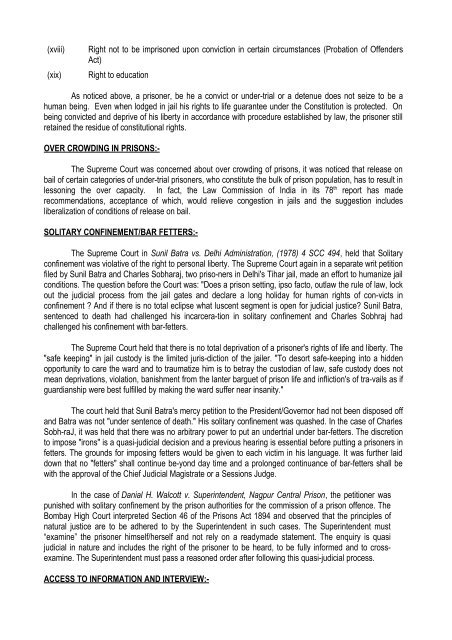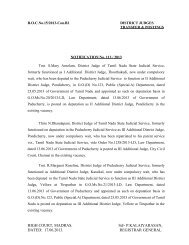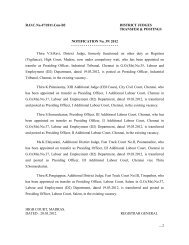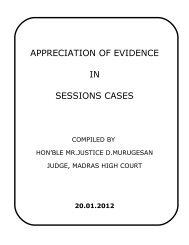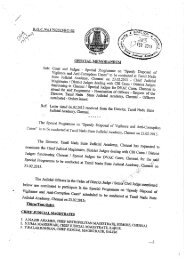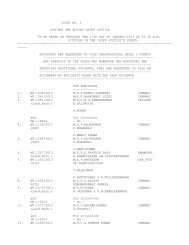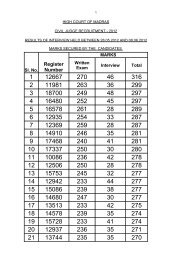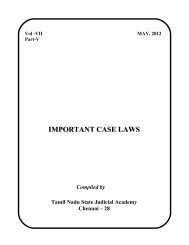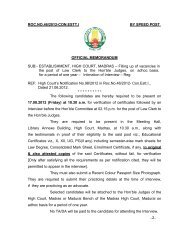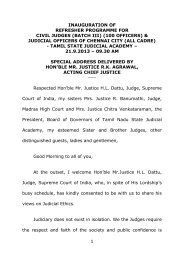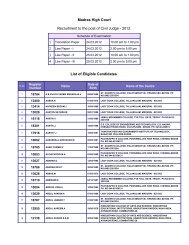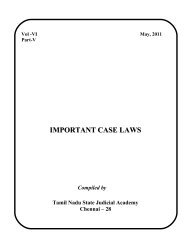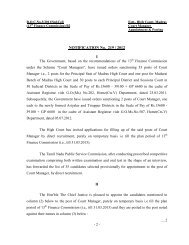Role of Prisoners and Convicts under the Criminal Justice ...
Role of Prisoners and Convicts under the Criminal Justice ...
Role of Prisoners and Convicts under the Criminal Justice ...
You also want an ePaper? Increase the reach of your titles
YUMPU automatically turns print PDFs into web optimized ePapers that Google loves.
(xviii)<br />
(xix)<br />
Right not to be imprisoned upon conviction in certain circumstances (Probation <strong>of</strong> Offenders<br />
Act)<br />
Right to education<br />
As noticed above, a prisoner, be he a convict or <strong>under</strong>-trial or a detenue does not seize to be a<br />
human being. Even when lodged in jail his rights to life guarantee <strong>under</strong> <strong>the</strong> Constitution is protected. On<br />
being convicted <strong>and</strong> deprive <strong>of</strong> his liberty in accordance with procedure established by law, <strong>the</strong> prisoner still<br />
retained <strong>the</strong> residue <strong>of</strong> constitutional rights.<br />
OVER CROWDING IN PRISONS:-<br />
The Supreme Court was concerned about over crowding <strong>of</strong> prisons, it was noticed that release on<br />
bail <strong>of</strong> certain categories <strong>of</strong> <strong>under</strong>-trial prisoners, who constitute <strong>the</strong> bulk <strong>of</strong> prison population, has to result in<br />
lessoning <strong>the</strong> over capacity. In fact, <strong>the</strong> Law Commission <strong>of</strong> India in its 78 th report has made<br />
recommendations, acceptance <strong>of</strong> which, would relieve congestion in jails <strong>and</strong> <strong>the</strong> suggestion includes<br />
liberalization <strong>of</strong> conditions <strong>of</strong> release on bail.<br />
SOLITARY CONFINEMENT/BAR FETTERS:-<br />
The Supreme Court in Sunil Batra vs. Delhi Administration, (1978) 4 SCC 494, held that Solitary<br />
confinement was violative <strong>of</strong> <strong>the</strong> right to personal liberty. The Supreme Court again in a separate writ petition<br />
filed by Sunil Batra <strong>and</strong> Charles Sobharaj, two priso-ners in Delhi's Tihar jail, made an effort to humanize jail<br />
conditions. The question before <strong>the</strong> Court was: "Does a prison setting, ipso facto, outlaw <strong>the</strong> rule <strong>of</strong> law, lock<br />
out <strong>the</strong> judicial process from <strong>the</strong> jail gates <strong>and</strong> declare a long holiday for human rights <strong>of</strong> con-victs in<br />
confinement ? And if <strong>the</strong>re is no total eclipse what luscent segment is open for judicial justice? Sunil Batra,<br />
sentenced to death had challenged his incarcera-tion in solitary confinement <strong>and</strong> Charles Sobhraj had<br />
challenged his confinement with bar-fetters.<br />
The Supreme Court held that <strong>the</strong>re is no total deprivation <strong>of</strong> a prisoner's rights <strong>of</strong> life <strong>and</strong> liberty. The<br />
"safe keeping" in jail custody is <strong>the</strong> limited juris-diction <strong>of</strong> <strong>the</strong> jailer. "To desort safe-keeping into a hidden<br />
opportunity to care <strong>the</strong> ward <strong>and</strong> to traumatize him is to betray <strong>the</strong> custodian <strong>of</strong> law, safe custody does not<br />
mean deprivations, violation, banishment from <strong>the</strong> lanter barguet <strong>of</strong> prison life <strong>and</strong> infliction's <strong>of</strong> tra-vails as if<br />
guardianship were best fulfilled by making <strong>the</strong> ward suffer near insanity."<br />
The court held that Sunil Batra's mercy petition to <strong>the</strong> President/Governor had not been disposed <strong>of</strong>f<br />
<strong>and</strong> Batra was not "<strong>under</strong> sentence <strong>of</strong> death." His solitary confinement was quashed. In <strong>the</strong> case <strong>of</strong> Charles<br />
Sobh-raJ, it was held that <strong>the</strong>re was no arbitrary power to put an <strong>under</strong>trial <strong>under</strong> bar-fetters. The discretion<br />
to impose "irons" is a quasi-judicial decision <strong>and</strong> a previous hearing is essential before putting a prisoners in<br />
fetters. The grounds for imposing fetters would be given to each victim in his language. It was fur<strong>the</strong>r laid<br />
down that no "fetters" shall continue be-yond day time <strong>and</strong> a prolonged continuance <strong>of</strong> bar-fetters shall be<br />
with <strong>the</strong> approval <strong>of</strong> <strong>the</strong> Chief Judicial Magistrate or a Sessions Judge.<br />
In <strong>the</strong> case <strong>of</strong> Danial H. Walcott v. Superintendent, Nagpur Central Prison, <strong>the</strong> petitioner was<br />
punished with solitary confinement by <strong>the</strong> prison authorities for <strong>the</strong> commission <strong>of</strong> a prison <strong>of</strong>fence. The<br />
Bombay High Court interpreted Section 46 <strong>of</strong> <strong>the</strong> Prisons Act 1894 <strong>and</strong> observed that <strong>the</strong> principles <strong>of</strong><br />
natural justice are to be adhered to by <strong>the</strong> Superintendent in such cases. The Superintendent must<br />
“examine” <strong>the</strong> prisoner himself/herself <strong>and</strong> not rely on a readymade statement. The enquiry is quasi<br />
judicial in nature <strong>and</strong> includes <strong>the</strong> right <strong>of</strong> <strong>the</strong> prisoner to be heard, to be fully informed <strong>and</strong> to crossexamine.<br />
The Superintendent must pass a reasoned order after following this quasi-judicial process.<br />
ACCESS TO INFORMATION AND INTERVIEW:-


